Spice Up Your Life: 10 Hilariously Good Meat Seasoning Tips You Can’t Ignore
Meat without seasoning is like a party without music — technically happening, but seriously missing the vibe. Whether you're a seasoned grill master or someone who just figured out that steak isn't just beef with a different name, this guide will help you elevate your meat game while keeping things light and fun.
Table of Contents
- Introduction
- Top 10 Meat Seasoning Tips (with Jokes)
- Spice Breakdown: What Does What?
- Visual Spice Comparison Table
- Common Seasoning Mistakes (and How to Avoid Them)
- Conclusion
Why Seasoning Is the Real MVP of Meat
Let’s get one thing straight: seasoning isn’t just about making your ribs smell like your abuela’s kitchen (although that’s a plus). It's science, art, and a bit of magic rolled into one savory package. The right blend can transform a bland burger into a flavor bomb, and the wrong one? Well, let’s just say it might end up in the compost bin instead of your mouth.
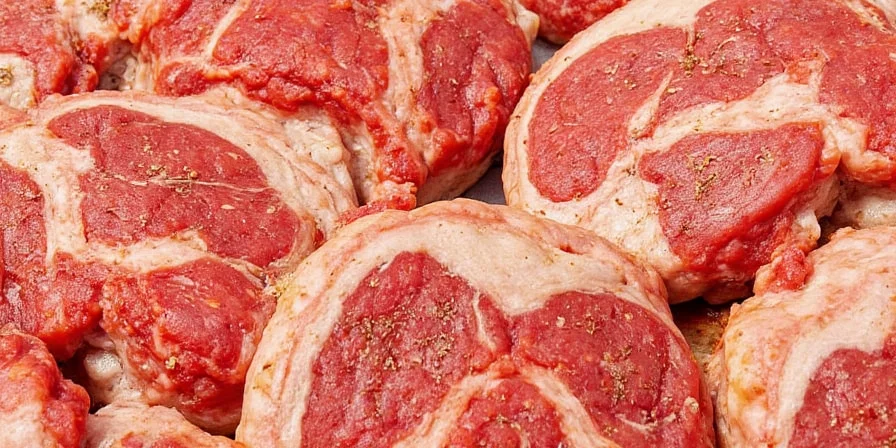
Top 10 Meat Seasoning Tips (with Jokes!)
Here are 10 practical yet hilariously useful meat seasoning hacks you’ll want to write down before they disappear like salt in your soup.
- Don’t Be a Salt Snob: Salt is your BFF. Don’t skip it unless you’re trying to recreate a hospital cafeteria experience at home.
- Balance Sweet & Heat: Pair brown sugar with chili powder for a sweet-spicy combo that slaps harder than your neighbor’s dog when he hears the mail truck.
- Toast Your Spices First: A quick toast in a dry pan unlocks flavors like a genie granting wishes — minus the lamp rubbing.
- Use Acidic Friends: Lemon juice or vinegar brightens everything up like your favorite playlist after a long day.
- Garlic ≠ Garlic Powder: Fresh garlic hits different. But if you’re late and desperate, garlic powder is the emergency backup singer who actually holds their own.
- Coffee Rub = Game Changer: Add ground coffee to your rub for a deep, earthy note that pairs beautifully with BBQ sauces and confused family members.
- Rest Your Seasoned Meat: Letting it sit for 30 minutes before cooking is like giving it a pep talk — “You got this, meat.”
- Different Meats, Different Rules: Beef loves bold spices. Chicken likes subtlety. Pork wants something sweet and smoky. Treat them like dating profiles.
- Sugar Burns Fast: If you're grilling, apply sugary rubs later in the game — unless you enjoy charcoal-flavored meatballs.
- Don’t Overseason for Others: Not everyone wants to cry like they’re watching *Titanic* again because of your jalapeño-heavy rub. Adjust to your audience.
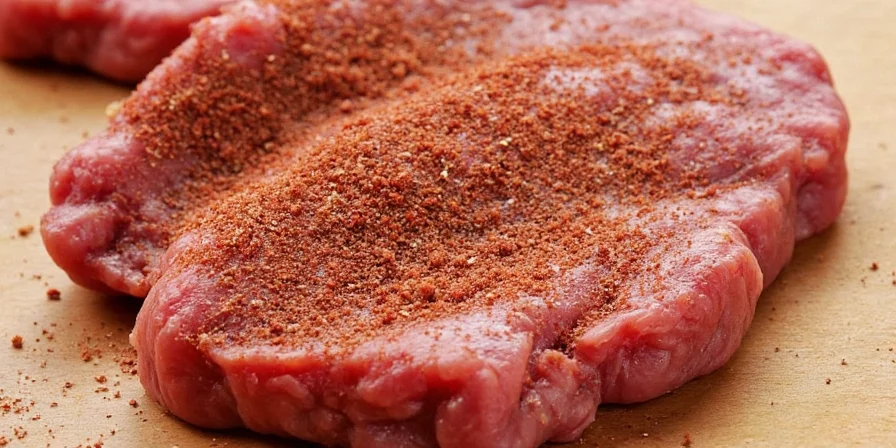
Spice Breakdown: What Does What?
To truly master meat seasoning, you gotta know what each spice brings to the table. Here's a quick breakdown:
- Paprika: Adds color and a mild, slightly sweet flavor. Great for presentation and pretending you’re a food blogger even if your only camera is your phone.
- Black Pepper: Sharp and earthy. Best used freshly cracked unless you want your meat to taste like the 90s.
- Cumin: Earthy and nutty. Often found hanging around with chili powder, making tacos jealous.
- Chili Powder: Varies by brand, but generally spicy-sweet. Your go-to for Tex-Mex vibes and midlife crises.
- Brown Sugar: Balances heat, caramelizes nicely. Makes your meat look good for Instagram shots.
- Smoked Paprika: Adds smokiness without fire. For those who want to taste the campfire without losing eyebrows.
- Cayenne: Bring the burn. Use sparingly unless you enjoy explaining why you’re drinking milk from a bowl.
- Fennel Seeds: Slightly licorice-like. Perfect for Italian sausage or impressing guests who thought you were just a grilled cheese expert.
- Coffee Grounds: Adds depth and umami. Ideal for red meats and people who think they’ve seen it all.
- Mustard Powder: Tangy and sharp. Works wonders in rubs and awkward small talk situations.
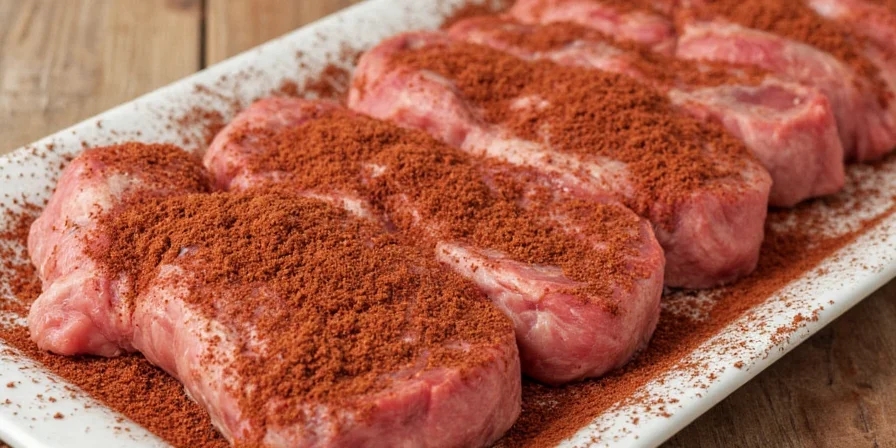
Visual Spice Comparison Table
Still confused about which spice goes where? Here's a handy-dandy table comparing common meat seasonings based on flavor profile, best use, and how likely they are to ruin your shirt if spilled.
| Spice | Flavor Profile | Best For | Shirt Stain Potential |
|---|---|---|---|
| Salt | Savory, enhances everything | All meats | Moderate (unless you overdo it) |
| Paprika | Mild, sweet, colorful | Chicken, seafood, garnish | High (red stains are dramatic) |
| Cumin | Earthy, nutty | Tacos, burgers, grilled veggies | Medium (smells worse than it stains) |
| Chili Powder | Spicy, sweet, variable | BBQ, Tex-Mex, chili | High (especially the red kind) |
| Brown Sugar | Sweet, caramelizes well | BBQ rubs, pork | Low (but sticky drama) |
| Smoked Paprika | Smoky, rich | Grilled meats, paella | High (color never fades) |
| Cayenne | Hot, fiery | Heat-loving dishes | Low (invisible until taste test) |
| Fennel Seeds | Herbal, anise-like | Italian sausage, charcuterie | Low |
| Coffee Grounds | Deep, bitter, complex | Beef, brisket, lamb | Very High (like ink… permanently) |
| Mustard Powder | Tangy, pungent | Brisket, pork shoulder | Medium (lingers in nose more than clothes) |

Common Seasoning Mistakes (and How to Avoid Them)
We’ve all been there. You’re feeling fancy, dump every spice in the cabinet onto your roast, and end up with something resembling a mad scientist’s lab experiment. Avoid these blunders:
- Too Many Chefs (and Spices): Stick to 5–7 spices max. Unless you’re hosting a spice rave, less is usually more.
- No Rest Time: Season early and let it sit. Rushing this step is like skipping foreplay — nobody wins.
- Forgetting Fat: Spices love fat. Rub directly into marbled cuts or add oil first so they stick around like clingy exes.
- Underseasoning: Bold meat needs bold seasoning. Be brave, or your ribeye will die disappointed.
- Using Old Spices: Spices don’t last forever. If your cumin smells like dust and sadness, toss it and start fresh.
- Applying Too Late: Sugary rubs should be added just before grilling — unless you like carbonized crusts and regret.
- Ignoring Texture: Crushed pepper adds bite. Ground pepper is smoother. Choose wisely depending on the texture mood you're in.
- Not Tasting as You Go: Taste-test your rub before applying. You wouldn’t paint a wall green without checking the swatch, would you?
- Overdoing One Flavor: Dominant flavors can kill balance. Even garlic has its limits (yes, really).
- Assuming All Salts Are Equal: Kosher salt fluffs better than sea salt. Use what matches your application technique.
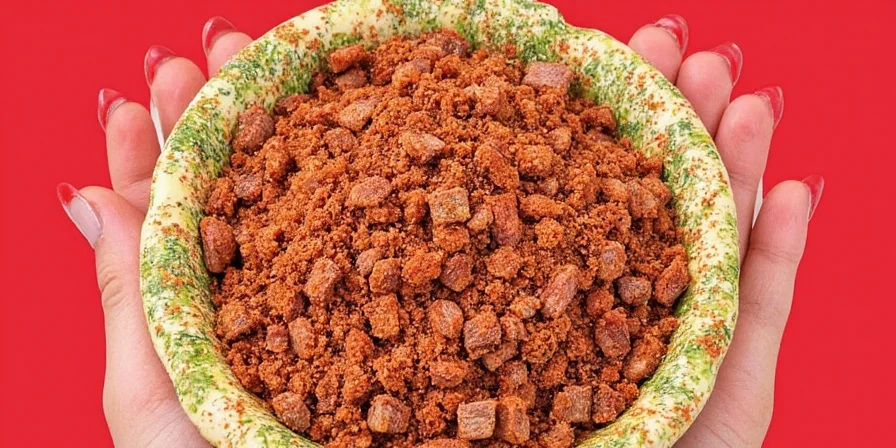
Conclusion: Spice It Up Like a Pro
Seasoning meat is part art, part science, and part comedy routine if you mess up enough times. With the right spices, a little knowledge, and some humor, you can turn any cut of meat into a showstopper. Remember: salt is your friend, cayenne is your warning sign, and coffee might just save your next barbecue.
So go ahead, experiment boldly, season generously, and laugh loudly — especially when the neighbors ask what that amazing smell is coming from your backyard.

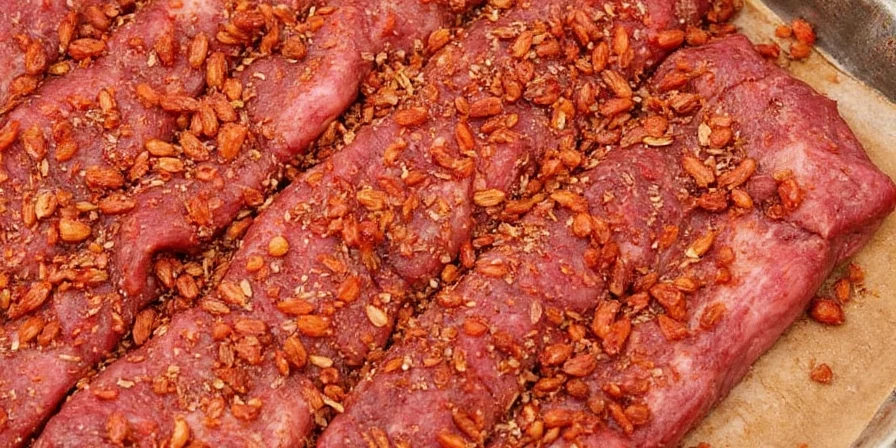









 浙公网安备
33010002000092号
浙公网安备
33010002000092号 浙B2-20120091-4
浙B2-20120091-4